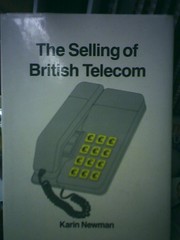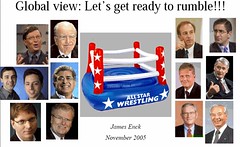
Posting may be a bit thin for a few days. Enjoy the sacred or secular seasonal observance of your choice, or not (that should cover all the potential sensitivities).
Plus ça change...
I bet the Friday afternoon office quiz is brutal.

For our monthly sector product (which I found recently, somewhat to my surprise, that some people actually seem to read) I entitled my end of year piece "Annus horribilis, annus mirabilis," which is precisely how it feels.
As of the close of play today, EuroTelco has underperformed the STOXX 600 by 21% year-to-date, and is the only sector to have lost money in an otherwise buoyant stock market. If investor attitudes were country music song titles, then this year would be called something like "Take Your Share Buyback and Shove It." Results in Q3 contained some bleak outlook statements regarding the next couple of years, to be followed (of course) by a strong recovery - a special Christmas menu of humble pie followed by jam tomorrow.
However, for all the shock and horror, it was a truly amazing year, the likes of which we may not witness again:
I've left a lot out, but as telco watchers of the future will no doubt say, if you can remember 2005 you weren't there!
My favorite telco event of the year was actually a fictional one - the arrival of the Wasp T-12 Speech Tool. I still occasionally get hits, sometimes from telcos and handset makers, searching for this - "What is the ARPU potential?" I can imagine them hopefully saying.
Anyway, it was an amazing year to behold and be part of (in my small virtual way), and no doubt 2006 will bring more wonders and horrors. I look forward to strolling through a nuclear winter EuroTelcoland in 2006 with you, my dear mega-uber value readers. Thanks to all of you for making this the best, and worst, year ever for EuroTelcoblog. God bless us every one.

Dug this old chestnut out yesterday, a very interesting account of the BT IPO process, stolen from the Nikko Securities London library in the days just before the company shut down in late '98. The BT IPO was arguably the pivotal event in the development of the EuroTelcohell investors are living through currently.
UPDATE: Double Platinum Club charter member Chickenman chimes in to let me know that this book is actually very valuable. At £53.78, it's worth 25 BT shares at their current price, or around 3.8 shares at their mid-bubble high. Does that observation in itself prove something?

I alluded to this presentation slide in a previous post, and finally got around to converting it to a .gif using the amazing CaptureWizPro.
"Just for fun, I called Direct Energy and after being transferred three time within Direct Energy’s customer service help desk, they finally asked me to call Rogers Telecom directly…which I did.
As it turns out, you have to subscribe to Rogers' home phone service for $29 CDN in order to get the free minutes and one free service (e.g, call display). At current rates, you can subscribe to a local home phone service from Bell for about $20-23 CDN + $6-8 for the feature. Therefore, Rogers is really using the LD as a simple means of acquiring the customer. While the offer sounds great, it does come at a
price of switching service providers."
"5. The Directive requires more invasive laws. Once adopted, this Directive will prove not to be the ultimate solution against serious crimes. There will be calls for additional draconian measures including:
-the prior identification of all those who communicate, thus requiring ID cards at cybercafes, public telephone booths, wireless hotspots, and identification of all pre-paid clients;
- the banning of all international communications services such as webmail (e.g. Hotmail and Gmail) and blocking the use of non-EU internet service providers and advanced corporate services.
EuroTelcos will scream about the compliance costs, but if the long-term by-product is degradation of user experience for third party communications tools (as well as crushing financially weaker small upstarts), I very much doubt they will drown in their own tears. As with all these attempts at centralized control, however, I'm skeptical - every action invites a reaction, and this is just the incentive for a truly plug-and-play Tor.

The Centrica story alluded to below has started me thinking: once all the hot-ass quadruple play business plans have been executed, what's left for telcos? Well, I think for smart ones it will probably be something which seeks to amortize the costs of multiple other domestic services across a common customer base and set of functions, as Centrica has attempted to do (let's face it, no one cares how good your VOD offering is if they're freezing butt with a broken boiler, or if they're at the mercy of the fluid work schedules and opaque pricing of one of this country's many fine independent builders). At c.10%, operating margins in this business are lower than EuroTelcoland is accustomed to (but interestingly, are more than double that of Centrica's traditional core business). Then again, what are we working towards here, glamor or survival? I wonder how many telcos have considered this as a realistic option for the future, and how many would consider it beneath them somehow?

Nice to be back in London, where advice like this is both readily given and universally ignored. Conveniently, it pretty much sums up investor views on telecom from my series of meetings last week, and also fits in nicely with a view of "the year that was" (the only STOXX 18 sector in negative territory year-to-date, etc...). More red on my screen today, largely as a result of the UK "quadruple play" story, and DowJones is reporting that Centrica has pulled the sale of its OneTel arm after only one bid was submitted at GBP100m. My boss, an energy analyst, reckons this is roughly the amount of invested capital in the business to date, i.e., it's a nil-premium bid.

Casting a red glow (this photo was taken just as the sign was lighting up) over a prominent intersection in Ginza is Vodafone. Several clients have asked over the past couple of days if there was a case to be made for a withdrawal from the Japanese market. My natural response would be that there is, but when I see the sheer amount of Vodafone advertising in this country (the "Vodafone crosses borders" slogan is also part of a ubiquitous TV ad campaign), I sense they genuinely are in for the long haul.

Inside the Yodobashi Camera store there was a long counter where sales representatives were promoting various broadband products, with most of the usual suspects represented. How about 50Mbps DSL for EUR28.50 per month? You got it. An extra EUR21 per month gets you 100Mbps symmetrical fiber. We asked one sales guy where fiber services were available, and he chuckled and replied, "Within the Kanto region (a mega-conurbation of 40m people), basically anywhere where there's train service." Which I unscientifically calculate as being pretty much everywhere...

Today I had a chance to stop off for a look in Akihabara. My locally based colleague remarked that the area's been under intense pressure as the various product ranges of its old specialist shops are subsumed in giant category killer stores around the city, such as the world famous Bic Camera. A new one, the Yodobashi Camera superstore, has descended on Akihabara, with an almost obscene range of tecnology on display. It was truly jaw-dropping stuff. If it ain't here, it probably doesn't exist.

At the other end of the tech spectrum from poor old "News-kun" was this wedding ceremony occuring just under my window. The happy couple were standing on a glass platform erected over the lavish hotel swimming pool. The guests were seated around the pool, and if you look carefully you can see the organist in the upper left corner.

One thing which I find really interesting about Japan is that, for all the orderliness and sparkling, hi-tech infrastructure, there is a layer of retro rot just barely concealed under the surface, and a fair amount of retro-futurism, which I love. This is a newspaper vending machine, my guess is from the 1980s, still standing on the street, with newspapers still inside (I couldn't see if they were recent), but it looks entirely forgotten and forlorn. It's called "News-kun," "kun" being a suffix indicating a younger person, or a boy.

This is a very poor photo, but I was walking past and shot it just as the doors slid open. Basically, I am afraid of pachinko parlors and their management, nuff said. Anyway, one thing that has always amazed me about Japan is the seemingly inexhaustible appetite which many people seem to have for it. It's hard to tell from this picture, but most of the people inside looked to be college students, or around that age, not the sad middle-aged man crowd which I always associated with pachinko when I lived here. Internet gaming, with all its attractions, is indeed impressive, but it seems that people who play pachinko are looking for something which may not be replicable online, even if they were allowed to win money. It seems to me that the experience involves some very unique aspects (cramped seating, a choking cigarette haze, deafening music, and the incessant din of the machines themselves), which no amount of Ajax could recreate.

Just across the road from the Vodafone shop, things were much quieter in the au shop (au is the fantastically successful mobile brand of KDDI). So quiet, in fact, that the management saw fit to send two young girls in long puffer jackets (deja vu of Yahoo! BB's tribe of street-pounding evangelists some years back) out in front of the shop. One exhorted passersby with a microphone and hectoring nasal tone unique to young Japanese women, while her colleague handed out packs of tissue, which believe it or not, are very common advertising tools in Japan.

The Vodafone shop in Monzennakacho near my hotel was very lively this Sunday afternoon, somewhat surprising for a brand which is struggling. The lifesize cutout of some popstar (unknown to me) in the shop window bears a clever marketing pun. The text reads "Vodafone crosses borders," but the word "borders" is rendered in a Japanized English rather than the native word. This comes out as "bōdaa," which sounds like the first two syllables of the Japanese pronunciation of the company name, i.e., "Bōdafōn."
"Telephone networks are made up of regional, domestic networks united
together in agreement of the ITU framework. A similar situation may start
with the internet." (?)
"Oceania was at war with Eurasia and in alliance with Eastasia. In no
public or private utterance was it ever admitted that the three powers had
at any time been grouped along different lines. Actually, as Winston well
knew, it was only four years since Oceania had been at war with Eastasia and
in alliance with Eurasia. But that was merely a piece of furtive knowledge
which he happened to possess because his memory was not satisfactorily under
control. Officially the change of partners had never happened. Oceania was
at war with Eurasia: therefore Oceania had always been at war with Eurasia.
The enemy of the moment always represented absolute evil, and it followed
that any past or future agreement with him was impossible."
"If IBM, et al, lose this one, there could be potential licensing issues on a lot of VoIP-related software (especially software like Asterisk @ Home, which actually bundles the Linux OS with Asterisk on one CD). It would also increase the costs of the voice ISPs, as they'd start having to pay license fees (calculated at the moment on a completely unknown basis). Also, in light of all the 'open' stuff you've been talking about recently, I think this is quite interesting. Five big gun commercial giants getting together to keep something free for the good of the public. That's a sea change isn't it?"
"This enables our city to compete with other European cities. The fiber network
delivers to Amsterdam an innovative and freely accessible infrastructure,
suitable to support growth in demand for the next 30 years or more. In this way
we ensure a wide open marketplace for innovative service-providers and economic growth, as well as a fast track for the smarter and cheaper delivery of care, education and other public services."